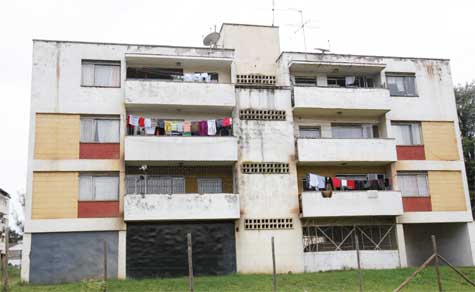 |
| Three bedroomed flats in Jamhuri Estate near Ngong Road.[PHOTOS: WILBERFORCE OKWIRI / STANDARD] |
The tenants living in city council owned houses in Nairobi pay a small percentage of the market rate—in rent. Little wonder then that these houses are handed down from one generation to the other, writes HAROLD AYODO
Living in a relatively low-priced City Council of Nairobi houses is the dream of many families to save on rent.
But even as the houses are pocket friendly, tenants owe City Hall a whooping Sh93 million in unpaid rent.
Glaring disparities in rent between council houses and those that are privately owned show why the council’s houses are not only hot cakes but are passed down from one generation to the other.
For instance, a three bed roomed public house in Mariakani in South B goes for Sh10,000 per month while the market price in the area for the same size of house is between Sh50,000 and Sh55,000.
Therefore, a tenant in a privately owned house in South B can rent five houses owned by City Hall in Mariakani flats.
Moreover, a privately owned two bed roomed house in South B goes for Sh25,000 per month and a bed sitter in the same areas fetches Sh15,000 per month.
Other three bed roomed houses owned by the City Council of Nairobi at Sh10,000 monthly are in New Ngara, Old Ngara, Kariokor and Buru Buru.
Currently, a refurbished three bedroomed maisonette in Buru Buru estate goes for Sh30,00 per month.
It is even pocket friendly to stay in a house owned by City Hall at the posh Joseph Kang’ethe (Woodley) estate at Sh14,500 for a three bed roomed house!
In Eastlands, rents in some of the 22 public estates like Bahati, Ziwani,Landhies Road, and Embakasi are from a paltry Sh500 per month.
City Hall tenants in Harambee, Mbotela, New Pumwani, Bondeni, Kaloleni, Uhuru, Maringo, Jerusalem, Jericho, Lumumba, Ofafa and Mbotela also pay rent below Sh4,500.






